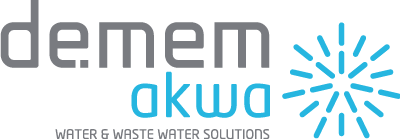News
NewsInterview with Mr. Andreas Kroell, CEO of De.mem Ltd
The original interview was published in German language. Please see the following link: “Bei der Wasseraufbereitung werden Membranloesungen in den kommenden Jahren auf eine sehr hohe Nachfrage stossen”
Please see the English translation as follows:
„We expect a strong demand for membrane solutions for water treatment applications in coming years”
Andreas Kroell is the CEO of De.mem (ASX: DEM), an ASX listed Australian headquartered water treatment business. He speaks about current trends within the water treatment industry, the segments which he finds particularly interesting, and why the M&A activity in this sector should continue.
The water treatment sector is considered an industry with a bright future. What are the most important trends within this segment, in your opinion ?
Andreas Kroell: Among the key developments are the increasing scarcity of water and, as a consequence of this, more and more regulation, which requires companies to invest in water and waste water treatment systems. This will drive the market growth in coming years. Also, this explains why De.mem’s focus is on this particular segment – corporate and industrial customers.
Which methods to treat water and waste water exist ?
Kroell: Water can contain a wide variety of contaminants – from bacteria and viruses to heavy metals as well as chemicals, pesticides or microplastics. Corresponding to this, the range of water treatment processes is very wide. Which process is deployed depends on the particular contaminant and application. As a result, the water treatment industry is highly fragmented. Examples for common treatment methods include biological processes, which are used for waste water streams with high organic content. Chemical processes such as flocculation are used to treat water with high turbidity or small solids content. Membranes are another widely used treatment method. They provide for a filtration- and separation method, which deploys the membrane as a physical barrier similar to a sieve. This allows water molecules to pass through, but rejects larger particles such as solids or contaminants, which do not fit through the tiny pores of the membrane.
Which technology is De.mem focusing on ?
Kroell: We are focusing on membrane technology, as we believe that this segment is particularly interesting from a commercial and technological perspective. Membranes are often used when a superior treated water quality is desired; for example, for the generation of drinking water or the recycling of industrial waste water. Membrane applications will meet a high demand in coming years, because companies will be required by regulators to re-cycle more waste water back into their production. We believe that we are well positioned for such applications with our proprietary membrane portfolio, while our specific focus is on hollow fibre membranes.
Why ?
Kroell: Firstly, De.mem is a technical leader in hollow fibre membranes. We have developed and validated a range of different technologies over the past few years. On the other hand, the hollow fibre membrane segment comes with a particularly strong growth potential. Hollow fibre membranes operate under low pressure and, as a result, are low in energy consumption. Also, hollow fibre membranes are generally easier to operate than flat sheet membranes. These are important arguments for our customers.
In line with this technical focus, we are deliberately positioning De.mem as a supplier of high quality products. We do not intend to compete with technically simpler and/or cheaper solutions, or work in “commoditized” segments of the market where only price is the key factor for the customer’s decision.
De.mem’s Graphene Oxide enhanced polymer membrane is currently undergoing product certification for drinking water applications in the US. Is this product suited for the mass market ?
Kroell: Absolutely. The market for domestic water treatment is a multi-billion dollar market. With our product, we can cover a large portion of this market.
You mentioned about the regulatory pressure. Will this trend continue ?
Kroell: We can feel this trend on a day-to-day basis in our business – in Australia, currently our main market, as well as in Europe, where we operate through our German subsidiary De.mem-Geutec. When an existing water or waste treatment system cannot meet the regulatory requirements any further, we are the first point of contact for our customers. We can either upgrade the existing equipment or replace it through a more modern and efficient solution. This trend is an important driver of our growth and makes it possible for us to increase market share.
For quite a while, we have been observing strong M&A activity in the water treatment industry. Will the consolidation continue ?
Kroell: In my opinion, yes. The reason is that water treatment is a very traditional sector, with long product life cycles and strong relationships between customers and their existing supplier. This means that organic growth takes longer when compared to other sectors – in particular for such suppliers with less innovative products and technology.
De.mem has acquired other companies in the past. Will acquisitions remain a part of the strategy?
Kroell: We acquired four small businesses since 2019 and integrated all of them successfully. Thereof, 3 are located in Australia and with De.mem-Geutec, one is based in Germany. All four of them have grown substantially after the acquisition, as the companies benefit from De.mem’s wider range of products and technology. Our German subsidiary De.mem-Geutec as an example approximately doubled its revenue since the acquisition in October 2019. Small acquisitions remain an attractive option for us to accelerate our growth, as far as they enable us to penetrate the market quicker and the financial terms & conditions of the transaction meet our expectations.
Could De.mem become an acquisition target itself for a larger international corporation, given of the company’s technological know how in membranes ?
Kroell: We believe that along with the continued validation of our range of membrane technologies we could be very interesting for leading corporations from the industry, whether initially as a partner or later on as an acquisition target.


